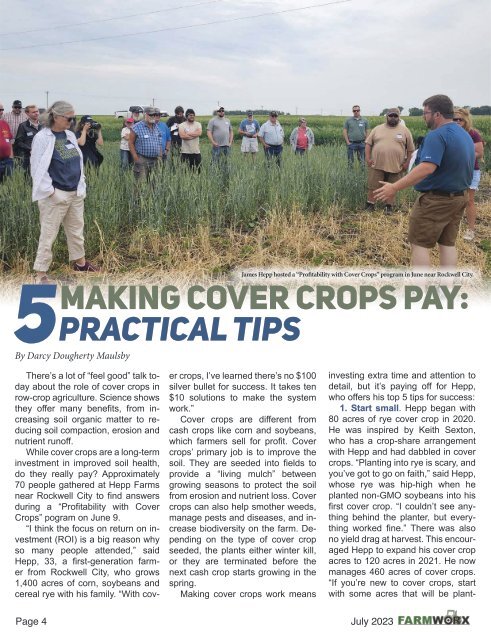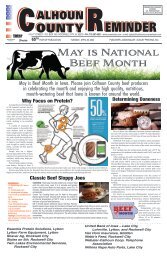July 2023 issue of the Farmworx Magazine
Free agricultural geared magazine published by Dudley Printing, Rockwell City, Iowa
Free agricultural geared magazine published by Dudley Printing, Rockwell City, Iowa
Create successful ePaper yourself
Turn your PDF publications into a flip-book with our unique Google optimized e-Paper software.
e<br />
m<br />
H<br />
s<br />
James Hepp hosted a “Pr<strong>of</strong>itability with Cover Crops” program in June near Rockwell City.<br />
Making Cover crops pay:<br />
5practical tips<br />
By Darcy Dougherty Maulsby<br />
There’s a lot <strong>of</strong> “feel good” talk today<br />
about <strong>the</strong> role <strong>of</strong> cover crops in<br />
row-crop agriculture. Science shows<br />
<strong>the</strong>y <strong>of</strong>fer many benefits, from increasing<br />
soil organic matter to reducing<br />
soil compaction, erosion and<br />
nutrient run<strong>of</strong>f.<br />
While cover crops are a long-term<br />
investment in improved soil health,<br />
do <strong>the</strong>y really pay? Approximately<br />
70 people ga<strong>the</strong>red at Hepp Farms<br />
near Rockwell City to find answers<br />
during a “Pr<strong>of</strong>itability with Cover<br />
Crops” pogram on June 9.<br />
“I think <strong>the</strong> focus on return on investment<br />
(ROI) is a big reason why<br />
so many people attended,” said<br />
Hepp, 33, a first-generation farmer<br />
from Rockwell City, who grows<br />
1,400 acres <strong>of</strong> corn, soybeans and<br />
cereal rye with his family. “With cover<br />
crops, I’ve learned <strong>the</strong>re’s no $100<br />
silver bullet for success. It takes ten<br />
$10 solutions to make <strong>the</strong> system<br />
work.”<br />
Cover crops are different from<br />
cash crops like corn and soybeans,<br />
which farmers sell for pr<strong>of</strong>it. Cover<br />
crops’ primary job is to improve <strong>the</strong><br />
soil. They are seeded into fields to<br />
provide a “living mulch” between<br />
growing seasons to protect <strong>the</strong> soil<br />
from erosion and nutrient loss. Cover<br />
crops can also help smo<strong>the</strong>r weeds,<br />
manage pests and diseases, and increase<br />
biodiversity on <strong>the</strong> farm. Depending<br />
on <strong>the</strong> type <strong>of</strong> cover crop<br />
seeded, <strong>the</strong> plants ei<strong>the</strong>r winter kill,<br />
or <strong>the</strong>y are terminated before <strong>the</strong><br />
next cash crop starts growing in <strong>the</strong><br />
spring.<br />
Making cover crops work means<br />
investing extra time and attention to<br />
detail, but it’s paying <strong>of</strong>f for Hepp,<br />
who <strong>of</strong>fers his top 5 tips for success:<br />
1. Start small. Hepp began with<br />
80 acres <strong>of</strong> rye cover crop in 2020.<br />
He was inspired by Keith Sexton,<br />
who has a crop-share arrangement<br />
with Hepp and had dabbled in cover<br />
crops. “Planting into rye is scary, and<br />
you’ve got to go on faith,” said Hepp,<br />
whose rye was hip-high when he<br />
planted non-GMO soybeans into his<br />
first cover crop. “I couldn’t see anything<br />
behind <strong>the</strong> planter, but everything<br />
worked fine.” There was also<br />
no yield drag at harvest. This encouraged<br />
Hepp to expand his cover crop<br />
acres to 120 acres in 2021. He now<br />
manages 460 acres <strong>of</strong> cover crops.<br />
“If you’re new to cover crops, start<br />
with some acres that will be plant-<br />
L<br />
S<br />
c<br />
c<br />
t<br />
i<br />
n<br />
b<br />
s<br />
a<br />
h<br />
a<br />
d<br />
a<br />
a<br />
g<br />
s<br />
w<br />
2<br />
3<br />
a<br />
L<br />
g<br />
a<br />
t<br />
g<br />
s<br />
o<br />
1<br />
p<br />
w<br />
t<br />
Page 4 <strong>July</strong> <strong>2023</strong>

















